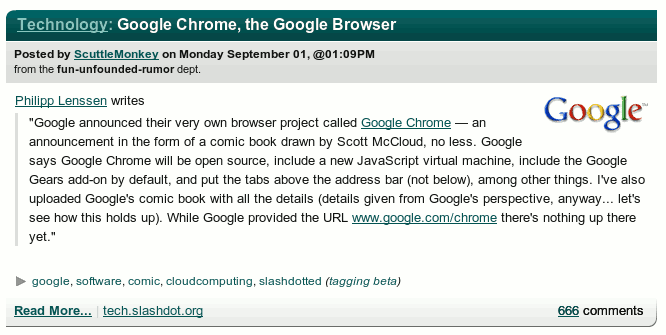Catching up on Slashdot this morning, I found the article on Google Chrome. Check out the number of comments:
Category: Web Browsers
New Browser: Google Chrome
 Google Chrome seems to be a multi-threaded open-source browser based on WebKit (with some code from Firefox as well), focusing on making a browser that will work well with web applications.
Google Chrome seems to be a multi-threaded open-source browser based on WebKit (with some code from Firefox as well), focusing on making a browser that will work well with web applications.
It’s got built-in support for the Gears API (not surprising). And, like Firefox 3, IE8, and Opera 9.5, it’ll do full-history search & auto-suggest in the location bar. Interestingly, they’ve adopted a couple of UI elements from Opera, including thumbnails of your most-visited pages when opening a new tab (like Opera’s Speed Dial, though in this case the list is automatically generated from your browsing behavior), and putting the tabs above the main toolbar — something that Opera has taken a lot of flack for.
According to the blog post, the first preview release should be out for Windows tomorrow, with Linux and Mac following.
Oddly enough, I found out about it through comics blogs (A Distant Soil, specifically), not tech blogs, because Google hired Scott McCloud (Understanding Comics) to explain what makes the browser different in comic-book form.
Improving Browser Reliability
The IEBlog recently posted about their efforts to improve reliability in Internet Explorer 8, particularly the idea of “loosely-coupled IE” (or LCIE). The short explanation is that each tab runs in its own process, so if a web page causes the browser to crash, only that tab crashes — not the whole thing. (It is a bit more complicated, but that’s the principle.) Combine that with session recovery (load with the same set of web pages, if possible with the form data you hadn’t quite finished typing in), and you massively reduce the pain of browser crashes.
I’d like to see something like this picked up by Firefox and Opera as well. They both have crash recovery already, but it still means restoring the entire session. If you have 20 tabs open, it’s great that you don’t have to hunt them down again. But it also means you have to wait for 20 pages to load simultaneously. It would be much nicer to only have to wait for one (or, if I read the IE8 article correctly, three).
Edited to add:
On a related note, I’ve run into an interesting conflict between crash recovery and WordPress’ auto-save feature. If you start a new post, WordPress will automatically save it as a draft. If the browser crashes, it will bring up the new-post page, but restore most of the form data you filled in. So the title, the text of your post, etc will all be there. But WordPress will see it as a new post, and you’ll end up with a duplicate.
This wasn’t a major problem when I encountered it — I had to reset the categories, tags, and post slug after I hit publish (since I hadn’t noticed that they’d been reset to defaults), and I just deleted the older, partial version of the post — but I can imagine if I’d uploaded an image gallery, I would have been rather annoyed, since there’s no way (that I’ve noticed) to move images from one post to another. Reuse them, sure, but not such that the gallery feature would work.
Summer of the Browser
Firefox: The new release candidate Firefox 3 RC2 is out. No date yet on the official launch, but they’re still saying June. Also, developers are starting to talk work that’s gone into what will become Firefox 3.1, such as completing CSS3 selectors support.
Opera: A new Opera 9.5 preview came out today, showcasing the browser’s new look. Also, the Opera Core team takes a look at what you can do if you put hardware acceleration on the whole browser.
Internet Explorer: IE8 beta 2 is scheduled for August. I’m looking forward to seeing what they’ve done, and figure I’ll start updating sites to accommodate changes. I held off changing too much when IE8b1 came out, because some of the differences were obviously bugs (triggering the Caio Hack, for instance; and yes, I reported it).
Flock has been moving ahead with small, rapid releases, adding integration for new services each time. They just added Digg and Pownce in Flock 1.2 a few days ago. Now they’re getting ready to start on Flock 2.0, which will merge in all the new capabilities of Firefox 3. That means it’ll get new rendering capabilities, better memory management, probably EV certs and such.
Web Browser Milestones Passed
Last October I wrote about some milestones in web browser marketshare. Specifically, I was looking forward to IE7 overtaking IE6, and to Firefox overtaking IE6. Well, both of those have finally happened, at least on this site, and a little more besides. Take a look at these stats from May 2008:
| Usage | Browser | Notes |
|---|---|---|
| 61.2% | IE (all) | |
| 35.7% | IE 7 | |
| 28.6% | Firefox (all) | |
| 26.4% | Firefox 2 | |
| 25.1% | IE 6 | |
| 4.7% | Safari | |
| 1.9% | Mozilla | (still not sure if this is SeaMonkey or a catch-all) |
| 1.4% | Opera | |
| 1.0% | Firefox 3 |
Back when I wrote the original post, I had a series of 5 or 6 milestones in mind, but decided to keep it simple and only post the first two. The next one after Firefox passing IE6 was for Firefox 2+ to pass IE6. I should have been checking in more frequently, since it already has.
So what’s next? Well, I expect to see the following in the next year or two:
- Firefox 3 replacing Firefox 2. It’s already got a strong pre-release following. (Fx2 will stick around while there are still Win98 and WinMe users, but they’re already at less than 1% here and falling.)
- Firefox 1 fading into the sunset in favor of newer, more capable releases.
- Netscape disappearing into history. (It’s already below 1% here.)
- IE6 dropping below 25%, 20%, 10% (watching it go to single digits will be satisfying), and finally 1%.
- Safari approaching 10%. It’s holding steady here, but keeps climbing globally.
Things I’d like to see, but am less confident about in the near-term:
- IE6 disappearing from the radar. There are hold-outs, both at the user and the sysadmin level, plus a sizeable minority on Windows 2000. Plus I think Microsoft is committed to supporting IE6 through the lifetime of Windows XP, which means they’ll keep shipping security fixes until 2014. On the other hand, IE 5.0 is technically still supported as part of Windows 2000, but I see very few IE5 visitors these days.
- IE8 replacing IE7, for most of the same reasons it’s taking so long for IE7 to replace IE6.
- Opera breaking out of its steady marketshare and hitting a solid 5%. That would make them much harder to ignore. (10% would be better, since Safari’s still struggling for recognition at 6%.) Of course, to get there they’ll have to pull off a major publicity coup.
- IE dropping below 50%. Could be done, but it’ll be tough. If there’s no majority browser, it’ll be very difficult to justify building a site for one browser only.
Of course, these will probably all happen faster locally than globally, since the audience seems to skew slightly toward the alternatives, but then local stats are the ones that actually matter for a specific site.
